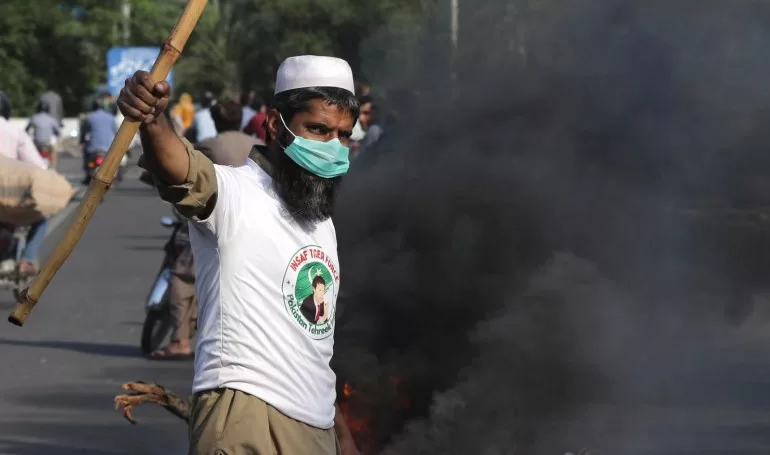Less than two weeks ago, Ali Amin Gandapur, the chief minister of the Khyber Pakhtunkhwa province and a PTI leader, had refused to participate in Sharif’s oath-taking ceremony.
On Wednesday, however, both Gandapur and Sharif appeared reconciliatory.
The federal government will fulfil all “genuine” demands of the Khyber Pakhtunkhwa, which borders Afghanistan, said a statement issued by Sharif’s office.
Speaking to media after the meeting, Gandapur said that the prime minister assured him of working together for the “betterment of the people”.
“I also told him that it is necessary to engage with [former Prime Minister] Imran Khan to resolve political matters, to which he responded positively and said the meeting with him will be made possible,” he said.
The PTI has alleged rigging in the elections to favour Sharif’s Pakistan Muslim League-Nawaz (PMLN), and has staged protests demanding a recount of votes. The party has challenged the results of dozens of constituencies in court.
Khan’s party was stripped of its electoral symbol days before elections, forcing it to field candidates as independents, and its electoral campaign faced a crackdown by authorities. Khan has been behind bars since August last year, and days before the election was convicted on lengthy prison terms. Khan has dubbed the convictions politically motivated.
Despite the hurdles, PTI candidates managed to win 93 seats, the highest number, followed by PMLN at 75 seats, while Pakistan People’s Party (PPP) of former Prime Minister Benazir Bhutto stood in third position with 54 seats. Sharif was sworn as prime minister on March 4 after his PMLN stitched an alliance together with the PPP and other smaller parties.
‘The country needs to move forward’
Analysts have said the meeting may not reduce the political temperature, given that PTI continues to agitate against the election results.
Ahmed Ijaz, a political commentator, said that while it can be considered a smart move by the PTI to meet the prime minister and talk about getting relief for the province and its leaders, the party will not want to cooperate too closely with the PMLN.
“Both of these political parties function on two extremes, particularly the PTI. If anything, they will want to maintain this maximalist, anti-PMLN position. However, it serves the PMLN’s interest to try and bring the PTI to the table and talk, to reduce tension, give the impression of cooperation,” he told Al Jazeera.
“PTI’s entire politics exists on the narrative of its opposition against PMLN, as well as the coalition partners such as the PPP. This distance from other mainstream parties is what gives PTI its unique identity.”
However, another political analyst, Zaigham Khan, said that the fact that the PTI has decided to meet Sharif is evidence of the party’s growing maturity.
“The PTI understands it must rule a province, which is facing financial difficulties, and they cannot do it without help from the central government. They also know that having a provincial government means they have a safe space, they can conduct their politics, and they can even exert political pressure by doing well there,” he told Al Jazeera.
The PTI came to power nationally in August 2018, when Khan’s relations with the military were cordial. But four years later the relations soured. Khan was replaced as prime minister by Sharif after a parliamentary vote of no confidence.
On May 9 last year, thousands of PTI workers stormed the streets across the country and vandalised military installations after Khan was briefly arrested. The government retaliated by arresting senior PTI leaders along with thousands of party workers. Many are still in jail.
Islamabad-based Zaigham said that the PTI needed to find a way out with establishment, a euphemism used for Pakistan’s military, which Khan has accused of engineering his removal from power. The military has consistently denied those allegations.
“The country needs to move forward, and it cannot be done without giving space to the party that has won the most votes, and there are signs that the system realises that. After all, they are in power in Khyber Pakhtunkhwa province,” he added.
